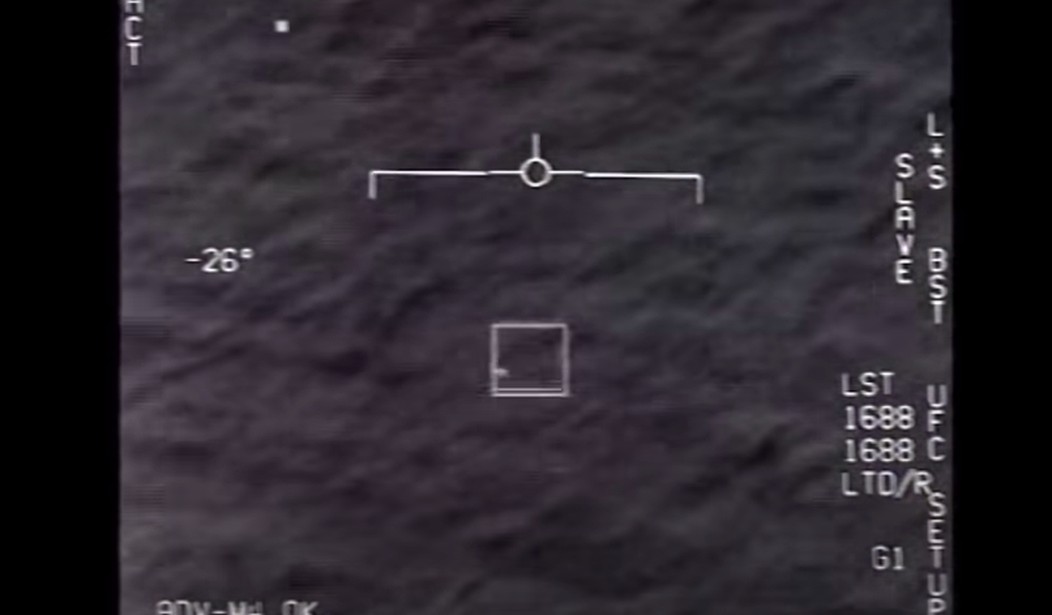By the end of June, the director of national intelligence and the secretary of defense will turn over a much-anticipated report concerning unidentified flying objects (UFOs). Sources have confirmed that the report will not conclude that the UFOs are extraterrestrial in origin, but it will not rule out that conclusion. Hugh Ross, an astrophysicist and founder of Reasons to Believe who has studied UFOs for decades, spoke with PJ Media about the report’s implications for Christianity. He argued that Christianity helps make sense of UFOs and of the possibility of extraterrestrial life.
“My personal experience in dealing with UFO reports is about 99% of what people report to me I can explain as natural phenomena, hoaxes, or military activity that either is classified or unfamiliar to the observer,” Ross, author of Lights in the Sky & Little Green Men: A Rational Christian Look at UFOs and Extraterrestrials, told PJ Media on Monday.
The remaining 1 percent, however, must be taken seriously, he argued.
That does not mean UFOs prove the existence of aliens. In fact, Ross claimed that “the 1% residual cannot possibly be physical aliens visiting us from another planetary system.”
Recommended VIP: Would the Existence of Aliens Disprove Christianity?
“Large-bodied physical beings cannot survive interstellar space travel in a spacecraft of lesser mass than our Moon, regardless of how technologically advanced they might be,” the astrophysicist argued. “Interstellar space is filled with particles and debris. The faster one moves through interstellar space and the larger the spacecraft the more damage the spacecraft will suffer.”
Ross mentioned Breakthrough Starshot, a project to explore the nearest exoplanet. The project aims to send roughly 1,000 tiny spacecraft — none of which are larger than 10 centimeters — to Promixa Centauri at 10-20 percent the speed of light. The astrophysicist noted that the project expects “at least 500 of the 1,000 spacecraft will be rendered non-functional by the time they arrive in the vicinity of Proxima Centauri’s planet.”
“That the 1% residual is not physical beings visiting us from another planetary system in physical craft is affirmed by observations that establish the UFO phenomena comprising the 1% residual consistently violate the laws of physics,” Ross added.
They often are reported at moving through our atmosphere at velocities greater than 10,000 mph, yet in no case is there an associated sonic boom or heat friction. Frequently, they are reported as making sudden sharp angle turns at velocities above 10,000 mph, something no physical object can perform without being destroyed. When the UFO is observed to crash, there is no debris or artifacts from the ‘”craft” at the crash site. These and other observations establish that the 1% residual is non-physical.
Even so, Ross argued that “the 1% residual must be real. Evidence for their reality is that at many of the crash sites there is a shallow crater, melted snow, and almost always damaged vegetation. When people experience close encounters, they experience harmful consequences and sometimes their animals as well.”
Recommended: Are Christianity and Science Incompatible?
“Therefore, the 1% residual must be real but not physical. This deduction explains why many non-theists dismiss UFOs as figments of peoples’ imaginations. Their worldview typically does not allow for the possibility of non-physical reality. As a Christian astrophysicist, my worldview does,” Ross explained.
“One of the cornerstone beliefs and doctrines of Christianity is that God created two distinct species of intelligent life: one species (us humans) that is constrained by the laws of physics and the cosmic spacetime dimensions and another species that is not so constrained (angels),” Ross argued.
To those who would scoff at the idea that angels (or demons) may be involved in some UFO experiences, Ross cited a fellow astrophysicist who described UFOs as “interdimensional phenomena.”
I may be the only Christian astrophysicist who has dedicated more than a decade to processing and analyzing UFO reports, but I am not the only astrophysicist who has become an expert on UFOs. At least five other astrophysicists have done so. We all agree with Jacques Vallée, the scientist who has done the most research on UFOs, that the residual UFOs are, in his words, an interdimensional phenomena.
If UFOs are “interdimensional phenomena,” why dismiss a supernatural explanation?
Ross said the pending UFO report presents an opportunity “for Christians to share their faith and explain how Christianity birthed the scientific method and the scientific revolution.” Indeed, modern science grew from medieval natural philosophy and Christianity inspired the seminal figures of the scientific revolution. “Science would not be where it is today if it were not for the Bible and the Protestant Reformation.”
Recommended: ESV Old Testament Editor: Both Creationists and Evolutionists Get Genesis Wrong
To those who claim that science and religion are fundamentally in conflict, Ross pointed not only to history but also to the two-books doctrine. “This doctrine — stated in article 2 of the Belgic Confession, in Psalm 19:1-4, and Romans 1 of the Bible — declares that God has revealed Himself, His attributes, and His purposes for creating the universe and humanity in two completely trustworthy and reliable books: the book of nature and the book of Scripture (the Bible).”
“The Bible exhorts every human being to be diligent in their study of both science and theology, to anticipate that their study of nature will help them to better understand the Bible and that their study of the Bible will help them to better understand science,” Ross explained. “The Bible commands us to test everything and to hold fast to which proves to be good and true (1 Thessalonians 5:21). That is, we are to explore and test all phenomena and all hypotheses.”
In this vein, Ross argued that the possibility of alien life shouldn’t spook Christians.
“In my opinion, Christians have nothing to fear from the discovery of extraterrestrial life. The Bible tells us that God enjoys creating. Therefore, it certainly is within God’s prerogative to create life on another planet,” he said. Indeed, C.S. Lewis’ fictional space trilogy envisioned alien life on Venus and Mars, fitting extraterrestrials into a Christian science-fiction universe.
However, Ross also noted that “it is theologically possible that God designed the universe so that intelligent physical life exists on just one planet.” Only one planet is necessary for God to carry out His purposes as explicitly revealed in scripture.
“Historically, Christian scholars have debated on whether or not the Bible and Christianity allow for extraterrestrial life throughout at least the past 1,500 years,” Ross noted. “Personally, I have been on public record since the 1980s that inevitably the remains of life will be found on nearly every solar system body.”
That doesn’t mean this astrophysicist believes in little green men, however. Life need not have emerged anywhere except on Earth for the remains of life to spread throughout the solar system.
“Microbial life has been extremely abundant on Earth throughout the past 3.8 billion years. When large meteorites strike Earth, many of these microbes are ejected throughout the solar system. Astronomers have calculated that 20,000 kilograms of Earth soil and rock resides on every 100 square kilometers of the Moon’s surface and as much as 200 kilograms on every 100 square kilometers of Mars’ surface. Attached to this ejected Earth soil and rock will be the remains of once-living microbes,” Ross explained, citing an article he wrote last year.
This life is extraterrestrial in scope, if not in origin. Even if God did not create life anywhere except on Earth, He has put in place mechanisms that spread that life out into space.
Recommended: Hugh Ross Presents Evidence From the Bible — Not Just Science — That the Genesis Flood Was Local
It seems unlikely that the government’s UFO report will answer the fundamental questions about extraterrestrial life, but even if aliens do exist, Christians should not fear the implications of this revelation. Rather, this report provides Christians with another opportunity to explain how science grew from the fertile soil of the Christian faith.









Join the conversation as a VIP Member